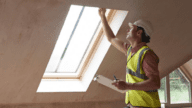How to Find a Good Home Inspector: Here’s What Homebuyers Should Look For
- Published on
- 10 min read
-
 Olivia Forgette, Contributing AuthorClose
Olivia Forgette, Contributing AuthorClose Olivia Forgette Contributing Author
Olivia Forgette Contributing AuthorOlivia Forgette is a real estate marketing specialist, writer, and homeowner who enjoys using her experience to help buyers and sellers feel informed and confident during their big real estate transactions. When not writing and blogging, you can find her playing with her dog, or in the kitchen baking some homemade sweet treats.
-
 Taryn Tacher, Senior EditorClose
Taryn Tacher, Senior EditorClose Taryn Tacher Senior Editor
Taryn Tacher Senior EditorTaryn Tacher is the senior editorial operations manager and senior editor for HomeLight's Resource Centers. With eight years of editorial and operations experience, she previously managed editorial operations at Contently and content partnerships at Conde Nast. Taryn holds a bachelor's from the University of Florida College of Journalism, and she's written for GQ, Teen Vogue, Glamour, Allure, and Variety.
You’re finally under contract on your dream home, and you’re ready to schedule the home inspection. The inspection is an essential piece of the homebuying puzzle, as it gives you an objective view into the condition of your new home. But, it also can also be an intimidating and stressful step.
Imagine if the home inspector uncovers some serious issues — or worse, they miss something that could be a dealbreaker. Selecting a competent and knowledgeable home inspector can save you heartbreak and potentially a lot of money. It also can provide you with some much-needed peace of mind.
The majority of home contracts are contingent on the results of the inspection, with the inspection contingency only being waived on 20% of contracts in Q2 2023, according to HomeLight’s recent survey. So, finding an inspector you can trust is vital.
With this in mind, we’ve scoured resources for all the ins and outs of home inspections to create this expert guide on how to find a good home inspector, what information you should look for, and which questions you should make sure to ask.
What is a home inspector?
A home inspector is a trained professional who assesses the condition of a property. They can earn credentials from reputable organizations such as the American Society of Home Inspectors (ASHI), as well as from the International Association of Certified Home Inspectors (InterNACHI).
Home inspectors observe and report on heating and cooling systems, plumbing, electrical, water and sewage, and roofing. They also check for evidence of insect, water, or fire damage to the property.
“A home inspection gives a pretty good, comprehensive snapshot of the property condition,” says Mike Follman, of Home Inspectors & More, Inc. in McHenry, Illinois. He says each property is unique, noting that issues can range from something minor like chipped paint or a loose toilet, to more serious problems like foundation damage. It is the inspector’s job to observe and report on the issues they find, but they don’t typically suggest fixes or estimate the cost of repairs.
Home inspectors also look at structural soundness, mechanical function, safety, and environmental issues (think lead-based paint or asbestos). “The home inspection offers you peace of mind at a low cost … the inspection also gives you the right to be able to renegotiate repairs with the seller before closing,” says Paula Burlison, a top real estate agent in Las Vegas, Nevada, who has over a decade of real estate expertise and nearly 500 transactions.
Selecting the right inspector
Start your search early
Begin looking for your home inspector before you start shopping for your new dream property. You want to make sure you have enough time to properly vet the inspector, and allowing yourself extra time can help take some of stress and rush out of the equation.
Get referrals
There are many factors that go into selecting a trustworthy home inspector. Burlison suggests a good first place to start is by looking for referrals. “I think that referrals are really sound. I will always give my clients three different inspectors that my past clients have used and had good experiences with,” she says.
Once you get some names, be sure to do your own research as well. Consult online reviews on Yelp, HomeAdvisor, Angi, and Google, and have conversations with the inspectors to get a sense of their experience and background. While most agents are looking out for your best interest, doing your own research and selecting your inspector will give you the assurance they are working independently and haven’t been influenced by the agent or other party to the transaction.
It’s also a good idea to reach out to friends and family members who recently moved and ask them for recommendations.
Check certifications
Contact professional organizations including ASHI, NABIE and InterNACHI for recommendations. Each of these organizations offer different certifications and requirements. Plus, consider that many states require inspectors to pass a licensing exam.
Research the company
Select an inspection company that only does home inspections. A company that also offers repairs and renovations may be looking to boost business by adding unnecessary issues to the inspection report. You can also check the company standing with the Better Business Bureau, as well as reviews, resolved complaints, and ratings.
Another key tip that Burlison shares is to make sure that the company you use is licensed and insured, and to request a sample copy of an inspection report so you can view the quality of their work.
The best deal isn’t necessarily the best choice
The average home inspection costs around $340, but Burlison notes that it’s imperative not to shop for a bargain. “You never want to choose an inspector based on price,” she continues. “Every time I’ve seen someone shop based on price, it turns out bad for the buyer.” As the old saying goes, you get what you pay for (at least in most instances). Prices for home inspections can vary based on your location and the size of the property being inspected, so be prepared for some variance in price and compare rates to determine what’s fair.
Compare inspection reports
After each home inspection, the inspector creates a home inspection report, which is typically at least a 30-page document. The inspector writes the report after a thorough evaluation of the property condition. It’s helpful to compare past reports from various inspectors to get an idea about the level of detail they provide and how they present their findings. A detailed report includes photos and descriptions of defects and explains why they matter. It also may include maintenance suggestions.
Get the details
This is a lot of information to keep track of, so having a list of questions handy will help ensure you cover all your bases.
To learn more about an inspector’s experience and qualifications, be sure to ask about:
- Certifications and credentials they hold (ASHI, InterNACHI)
- Current licensing in your state
- Their experience prior to becoming an inspector
- How long they’ve been a home inspector
- If they’re insured and bonded
- What the inspection covers
- What the inspection doesn’t cover
- How long the inspection takes
- Referrals
- Are they a full-time home inspector?
- Examples of past reports
- Specialty inspections that are specific to your property or area (air quality, sewer scoping, additional inspections on other structures on the property)
What to expect on inspection day
Inspection day is finally here, but what can you — as the buyer — really expect from the day? You’ll want to feel prepared and aware of what the inspector should be looking for. Bring a pen and paper along with you to take notes on what the inspector finds. Be sure to allow the inspector to do their job, but if you feel they aren’t being thorough enough, say something.
Burlison recommends that her buyers be present at the inspection. “It’s valuable to be able to go through the inspection with the inspector one-on-one and look at the items the inspector feels needs care or maintenance,” she explains.
Attending the inspection can also take some mystery out of the inspection report because you’re better able to understand what items the report is referring to. If you’re unable to go to the inspection, your agent can attend on your behalf to observe any notable findings that may be used as leverage during negotiations.
The seller and the listing agent generally won’t be present during the inspection. It’s also a good idea not to have friends and family present, or other professionals (like a general contractor) so you can allow the inspector to do their job with minimal interference.
Things the inspector should check during your home inspection include:
- Home exterior
- Roof (if visible; if it’s covered in snow, the inspector cannot inspect it)
- Garage
- Crawl space or basement
- Attic space
- HVAC
- Electrical
- Plumbing
- Windows/doors
- Interior condition
- Floors
- Pest inspection
- Water/fire/mold inspection
- Foundation
- Structural components
Keep in mind that elements that can’t easily be inspected visually might not be checked. For example, the inspector won’t be tearing open walls or inspecting potential issues that they cannot see.
“I had one house that had an open crawl space,” Follman recounts of a specific home that stands out for him. “It was a very tiny space under the 60-year-old house, but I was able to squeeze in to take a look. The entire bottom of the house was completely wet and had been for some time.” He then noticed the carpenter ants. Essentially, the beams had such extreme damage that they were crumbling, and they compromised the home’s structural integrity. The buyer ultimately decided the home wasn’t for them and moved on to a different property.
How long does a home inspection take?
Burlison tells her clients to expect the inspection to take roughly one hour for every 1,000 square feet. Often older homes may take longer, as they tend to have more wear and tear. Additionally, smaller homes may take less time to inspect, and the home’s layout may also affect the length of the inspection.
Once the inspection is complete, you should expect to receive the inspection report within a few days. When you get the report, you and your agent can review it and decide if renegotiations are necessary.
The final word on choosing your home inspector
The inspection is a crucial step in your homebuying journey, so it’s important that you know how to find a good home inspector with experience, credibility, and an excellent reputation. After all, buying a home is a huge investment, so you want to put it in the hands of someone you can trust.
A reliable home inspector can save you from a nightmare of hidden damage and costly repairs, put your mind at ease that the property you’re purchasing is in acceptable condition, and can educate you on potential issues. Find an inspector who’s not just looking at a house, but is looking out for you.
FAQs about finding a good home inspector
Check if the inspector is a member of national or state-level inspection organizations such as ASHI or InterNACHI. These organizations have set standards and codes of ethics that members must adhere to. Additionally, ask for the inspector’s license number (if applicable in your state) and verify it through your state’s regulatory board.
On average, a home inspection typically takes 2-4 hours, but this can vary depending on the size, age, and condition of the home. Older homes, larger properties, or those with more systems to inspect may require more time.
A comprehensive inspection report should provide detailed findings on the home’s systems and components, including the roof, foundation, HVAC, plumbing, electrical, and more. It should also include clear photographs, descriptions of any issues, and potential implications of those issues. A summary section highlighting major concerns can be helpful as well.
Yes, most inspectors encourage buyers to attend the inspection. This allows you to ask questions, get to know the home better, and gain a clearer understanding of any potential issues.
To ensure an unbiased inspection, it’s recommended that the inspector has no affiliations with repair or renovation companies. Also, although real estate agent referrals are helpful, doing your own research and due diligence will ensure you’re choosing an inspector based on their reputation and credentials, rather than any potential affiliations.
Header Image Source: (Mateus Campos Felipe / Unsplash)




